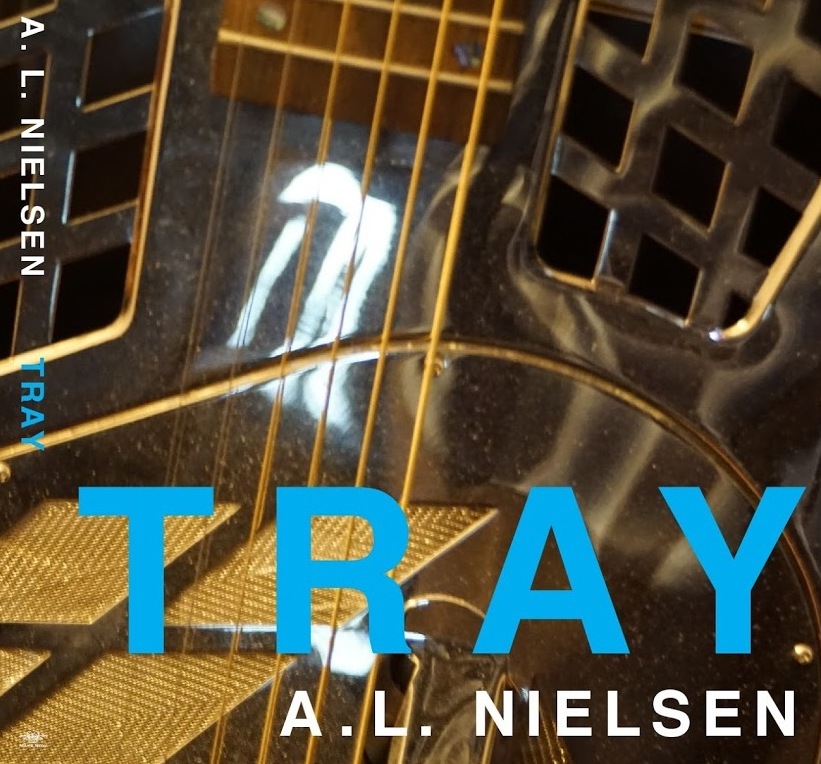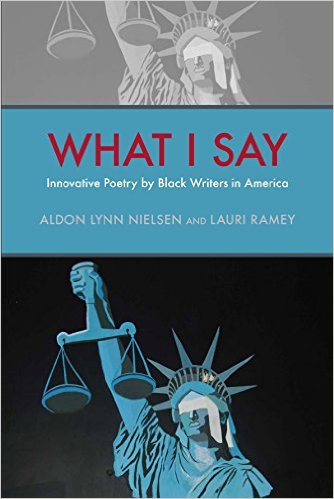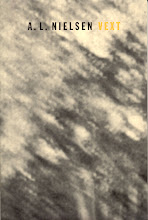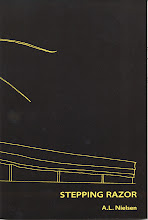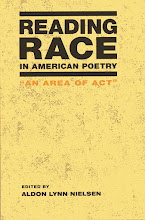I've been rereading this book that Manuel Brito was kind enough to send me as part of my preparation for the Early African Diasporic seminar at Penn State.
This volume has great chapters on early black historians, The Southern Negro and the Public Library, Hurston and stereotypes, Toomer and the Double Dealer, Phillis Wheatley "in Slavery's Recollective Economies" and much else. Manuel's own chapter is on "Widening the Paradigm of American Literature: Small Presses in the Publishing and Creation of New Hispanic Texts."
For more information click here.
Wednesday, March 16, 2016
Wednesday, March 02, 2016
E. Ethelbert Miller - The Aldon Nielsen Project #16 - "SAINT THOMAS OF LITERATURE"
Q. Provide us with a brief overview of the career of Lorenzo Thomas. What were his major contributions to American literature? When did you first encounter his work?
“All silence says music will follow”
Those words were my first encounter with Lorenzo Thomas. They form the opening line of “Onion Bucket,” one of two poems by Thomas selected by Larry Neal and Amiri Baraka for inclusion in Black Fire, at the time and still the major compendium of Black Arts Movement writings. The next Thomas poem in the anthology was “Twelve Gates.” I was a teen-aged reader at the time, still finding my way to the poetry that was to obsess me for life. These poems burnt themselves into my consciousness. I knew I would read more.
That “more” began coming my way a few years later, during my student years. I began to see copies of Hoo Doo review at a book store off Dupont Circle. There in issue number one was an offering by Thomas, “Sounds of Joy,” a title reminiscent for me of both Sun Ra and the joyful noise of the churchical. Hoo Doo 2 found Thomas weighing in with “Cosmic Communion.” The poem imagines a communication from a “magnetic magician” who advises “Be on a first name basis with planets / and stars.” Come the aptly identified issue 6 ½, and Thomas had signed on as guest co-editor with Adesanya Alakoye, who had been in an algebra class at Federal City College with me for a hot minute. Thomas’s own contribution to that issue was his essay on “Baraka in Newark.”
I still knew little of Lorenzo Thomas apart from these wonderful poems that appeared in some of the anthologies I was picking up, such as the encyclopedic The Poetry of Black America. and the stray prose piece in a journal here or there, and most of his early work was appearing in very small print runs from even smaller presses in New York, like Angel Hair press. It wasn’t until his collection The Bathers appeared in 1981 that I was able to see the full range of Thomas’s work, to see some of the magazine poems I’d encountered in the company of the poems from his small press books. “Onion Bucket,” “Twelve Gates,” “Cosmic Communion,” they were all here in this volume that Thomas had assembled, reproducing some of the art work by his brother, Cess, that had previously only been seen in those limited editions. The Bathers was itself limited, and is long out of print. (A couple decades ago I was able to teach the book in a class only because a forgotten box of the books had been found in a Berkeley basement and put on sale.) A bit later I found, in that same Dupont Circle shop where I’d run into Hoo Doo review, a book by Thomas that had in fact been published a couple years before The Bathers, Chances Are Few, from Blue Wind Press. The work in The Bathers had represented his major efforts from the beginning up to the mid-seventies, while Chances Are Few, despite preceding it, collected the then more recent work. (A new edition of Chances Are Few was published in 2003 with a few additional poems. That second publication remains available from Blue Wind.)
Slowly I began to learn more about this startlingly original poet. He had been one of the youngest members of the legendary Society of Umbra, a group of writers radical in both aesthetics and politics who had been congregating on New York’s lower East Side at readings that had themselves become the stuff of legend. Taking their name from a poem by one of the older members, Lloyd Addison, the group brought together both uptown and downtown poetic revolutionaries, and was later seen as having contributed to the emergence of the Black Arts Movement. Other writers participating included David Henderson, Oliver Pitcher, Norman Pritchard, Tom Dent, Art Berger, Maryanne Raphael, Askia Muhammed Toure, Calvin Hernton and so many more who were to be heard from significantly in the years to come. The group published several issues of an Umbra journal, which Henderson continued after he had moved to Berkeley. It was there that the famous Latin Soul issue of Umbra appeared. During my grad student years, I signed up for a class taught by Amiri Baraka, in the course of which I annoyed some of my fellow students (though evidently not Baraka) by using the discussion time to ask questions about Umbra, the Society of Young Men, poetry in the Village, etc. Lorenzo Thomas had been at the very heart of those activities, and as a scholar he was to become one of the most prominent historians of the group and their era, publishing important essays in places like the journal now known as African American Review. (Several scholars, including Jean-Philippe Marcoux, are digging into the archives and doing serious new work on Umbra – watch for their publications in the near future.)
But even as the Society of Umbra is gaining long overdue scholarly attention, Lorenzo Thomas’s years in Texas remain largely unattended. Recently I was talking to a colleague from another university who expressed surprise when I began talking of Harryette Mullen’s Texas years, of her interactions with Lorenzo Thomas and Ahmos zu Bolton – Not surprising when you notice things like the Kevin Young-edited anthology of poets born in 1960 and later, Giant Steps, which finds space for Harryette Mullen by changing her date of birth. Lorenzo Thomas played a crucial role in encouraging any number of important poets during the years after he left New York.
So by the time I finally got to know Lorenzo Thomas in person, I had come to a real appreciation of his importance as a poet, and as a participant/scholar of some crucial developments in the evolution of post-WWII poetry and poetics in this country. It was poet Charles Bernstein who made the introduction. As I remember it, we were standing in the lobby of a D.C. hotel during the convention of the Modern Language Association. Thomas was a gracious and generous person, with exactly my kind of wry humor, and we rapidly became fast friends. Over the coming years we were to appear on many stages together. We used to joke that we had become a sort of traveling tag team of poetry commentary; at one conference, he would give a keynote with me as respondent, and then at another it would be my turn to hold forth with Lorenzo coming on to set me straight. I recorded some of these sessions, and have been making a selection of them available from my archive at the Penn Sound web site. One of the more memorable occasions is one I only recently uploaded to Penn Sound. Lorenzo and I had been part of a wonderful gathering to honor Sterling Brown’s legacy at the Folger Shakespeare Library. Lorenzo and I were on a panel with Elizabeth Alexander. The event featured commentary by Haile Gerima, whose film After Winter remains the major documentary on Brown, my friend Joanne Gabbin, author of the first book-length study of Brown, Dolores Kendrick, Bernice Johnson Reagon, the whole thing moderated by Kojo Nnamdi. It was a powerful day and evening. Afterwards, Libbie Rifkin suggested that we do a smaller version as a panel at the AWP conference coming up in Baltimore. Lorenzo and I agreed at once.
Come the day, though, and Libbie was unable to join us, due to illness if I recollect, so Lorenzo and I were on our own. AND the conference organizers had stuck the thing in one of the 8:30 AM time slots. Lorenzo and I headed into the hotel basement wondering if anybody would be up and in attendance. When we arrived, there was Lucille Clifton already in a seat and ready for the session to get going. Lucille, another old friend from my grad school days, had been one of Brown’s students at Howard, and there was no way she was going to miss this. You can hear what Lorenzo and I said that day by navigating to this URL:
https://media.sas.upenn.edu/pennsound/groups/Heatstrings/Thomas-Lorenzo-and-Nielsen-Aldon_Sterling-Brown-Panel_AWP_Baltimore_3-1-03.mp3
Over time, Lorenzo and his partner, Karen Luik, would meet socially with me and Anna. Sometimes we’d be with others, like the time when we were all in Houston to honor Lorenzo’s work at the American Studies Association. (Lorenzo insisted on taking us all to dinner afterwards – Maria Damon and Kalamu ya Salaam were with us, I remember.) Other times it would be just the four of us. More than one year, we conspired to be at Boulder at the same time, along with Harryette Mullen at least once, and after doing various things for Naropa we’d spread a blanket behind their building and enjoy the fireworks together.
There was a long dry spell for Lorenzo, not in writing, but in book publishing. But then things started happening fast. There was a 1996 bilingual English/German collection from Edition Isele, There Are Witnesses / Es gipt Zeugen. In 1998, the Teachers and Writers collaborative published a volume by Lorenzo on African American literature in the creative writing class. In 2000, the University of Alabama Press published Lorenzo’s Extraordinary Measures: Afrocentric Modernism and 20th Century American Poetry in their prestigious Modern and Contemporary Poetics series. Then came the delightful chapbook Time Step: 5 poems 4 seasons, from a small press in California. That chapbook bore an epigraph from actor Donald O’Connor that aptly summed up Lorenzo’s career: “If you keep doing the Time Step long enough, people applaud.” Applause had been way too long coming to Lorenzo Thomas, but it was coming at long last. That chap book, like his early poetry collections, had been published in a limited print run, only one hundred copies, but much of the work became more widely available shortly thereafter in a triumphant volume from Coffee House Press, Dancing on Main Street. That book’s subsections bore titles that accurately reflected Lorenzo’s aesthetics: “Anyplace You’ve Ever Been,” “Rituals and Improvisations,” “The Simplest of All Mysteries,” “Resistance as Memory” and finally, “Dangerous Doubts.” We were back, it would seem, at sounds of joy and cosmic communion. No less than John Ashbery said that “Thomas’s brand of clairvoyance is not only useful, but beautiful.”
But Lorenzo didn’t have long to enjoy this late applause. He’d had health problems for a while. There’d been some pretty serious oral surgery that had affected his speech (though not his enthusiasm). Then the effects of his earlier smoking took their full toll. Lorenzo had to cancel a few out of town gigs; he was linked to oxygen now, and was just getting used to what that meant for his getting around. Still, the poetry continued coming, and there was the manuscript of another prose book going through the process of the University of Michigan Press. Then I got the message none of us is ever prepared to receive. Lorenzo sent me an email asking that I serve along with his brother as his literary executor. I emailed back to tell Lorenzo that while I would be honored to accept that heavy responsibility, he’d probably be doing the job for me long before I’d have to do it for him. (Not an extravagant reassurance – I’d survived octuple bypass surgery, so had a sort of expiration date of my own.) Only two weeks later, I got the devastating news from Karen that Lorenzo had passed from us.
These things hurt, but the work waiting to be done eased the pain a bit. I got busy doing the final editing on Lorenzo’s prose volume that he hadn’t lived to do, and in 2008, Michigan published Lorenzo’s Don’t Deny My Name: Words and Music and the Black Intellectual Tradition, a book so solid and so encompassing that the good folks at the University of Kansas History of Black Writing Project organized two NEH summer institutes thematically based in Lorenzo’s book. Next project on the horizon: The Collected Poems of Lorenzo Thomas.
I’ve never forgotten that first long ago reading in Lorenzo’s lines:
And those who own nothing what of those walking around
Without land, without cash value, properties. Without
Nothing in the name. Whose destinies
Are not marked or marked down.
When he signed my copy of the book that includes that poem, Lorenzo wrote words for all of us to live by: “All this effort / is toward / a better world.”
“All silence says music will follow”
Those words were my first encounter with Lorenzo Thomas. They form the opening line of “Onion Bucket,” one of two poems by Thomas selected by Larry Neal and Amiri Baraka for inclusion in Black Fire, at the time and still the major compendium of Black Arts Movement writings. The next Thomas poem in the anthology was “Twelve Gates.” I was a teen-aged reader at the time, still finding my way to the poetry that was to obsess me for life. These poems burnt themselves into my consciousness. I knew I would read more.
That “more” began coming my way a few years later, during my student years. I began to see copies of Hoo Doo review at a book store off Dupont Circle. There in issue number one was an offering by Thomas, “Sounds of Joy,” a title reminiscent for me of both Sun Ra and the joyful noise of the churchical. Hoo Doo 2 found Thomas weighing in with “Cosmic Communion.” The poem imagines a communication from a “magnetic magician” who advises “Be on a first name basis with planets / and stars.” Come the aptly identified issue 6 ½, and Thomas had signed on as guest co-editor with Adesanya Alakoye, who had been in an algebra class at Federal City College with me for a hot minute. Thomas’s own contribution to that issue was his essay on “Baraka in Newark.”
I still knew little of Lorenzo Thomas apart from these wonderful poems that appeared in some of the anthologies I was picking up, such as the encyclopedic The Poetry of Black America. and the stray prose piece in a journal here or there, and most of his early work was appearing in very small print runs from even smaller presses in New York, like Angel Hair press. It wasn’t until his collection The Bathers appeared in 1981 that I was able to see the full range of Thomas’s work, to see some of the magazine poems I’d encountered in the company of the poems from his small press books. “Onion Bucket,” “Twelve Gates,” “Cosmic Communion,” they were all here in this volume that Thomas had assembled, reproducing some of the art work by his brother, Cess, that had previously only been seen in those limited editions. The Bathers was itself limited, and is long out of print. (A couple decades ago I was able to teach the book in a class only because a forgotten box of the books had been found in a Berkeley basement and put on sale.) A bit later I found, in that same Dupont Circle shop where I’d run into Hoo Doo review, a book by Thomas that had in fact been published a couple years before The Bathers, Chances Are Few, from Blue Wind Press. The work in The Bathers had represented his major efforts from the beginning up to the mid-seventies, while Chances Are Few, despite preceding it, collected the then more recent work. (A new edition of Chances Are Few was published in 2003 with a few additional poems. That second publication remains available from Blue Wind.)
Slowly I began to learn more about this startlingly original poet. He had been one of the youngest members of the legendary Society of Umbra, a group of writers radical in both aesthetics and politics who had been congregating on New York’s lower East Side at readings that had themselves become the stuff of legend. Taking their name from a poem by one of the older members, Lloyd Addison, the group brought together both uptown and downtown poetic revolutionaries, and was later seen as having contributed to the emergence of the Black Arts Movement. Other writers participating included David Henderson, Oliver Pitcher, Norman Pritchard, Tom Dent, Art Berger, Maryanne Raphael, Askia Muhammed Toure, Calvin Hernton and so many more who were to be heard from significantly in the years to come. The group published several issues of an Umbra journal, which Henderson continued after he had moved to Berkeley. It was there that the famous Latin Soul issue of Umbra appeared. During my grad student years, I signed up for a class taught by Amiri Baraka, in the course of which I annoyed some of my fellow students (though evidently not Baraka) by using the discussion time to ask questions about Umbra, the Society of Young Men, poetry in the Village, etc. Lorenzo Thomas had been at the very heart of those activities, and as a scholar he was to become one of the most prominent historians of the group and their era, publishing important essays in places like the journal now known as African American Review. (Several scholars, including Jean-Philippe Marcoux, are digging into the archives and doing serious new work on Umbra – watch for their publications in the near future.)
But even as the Society of Umbra is gaining long overdue scholarly attention, Lorenzo Thomas’s years in Texas remain largely unattended. Recently I was talking to a colleague from another university who expressed surprise when I began talking of Harryette Mullen’s Texas years, of her interactions with Lorenzo Thomas and Ahmos zu Bolton – Not surprising when you notice things like the Kevin Young-edited anthology of poets born in 1960 and later, Giant Steps, which finds space for Harryette Mullen by changing her date of birth. Lorenzo Thomas played a crucial role in encouraging any number of important poets during the years after he left New York.
So by the time I finally got to know Lorenzo Thomas in person, I had come to a real appreciation of his importance as a poet, and as a participant/scholar of some crucial developments in the evolution of post-WWII poetry and poetics in this country. It was poet Charles Bernstein who made the introduction. As I remember it, we were standing in the lobby of a D.C. hotel during the convention of the Modern Language Association. Thomas was a gracious and generous person, with exactly my kind of wry humor, and we rapidly became fast friends. Over the coming years we were to appear on many stages together. We used to joke that we had become a sort of traveling tag team of poetry commentary; at one conference, he would give a keynote with me as respondent, and then at another it would be my turn to hold forth with Lorenzo coming on to set me straight. I recorded some of these sessions, and have been making a selection of them available from my archive at the Penn Sound web site. One of the more memorable occasions is one I only recently uploaded to Penn Sound. Lorenzo and I had been part of a wonderful gathering to honor Sterling Brown’s legacy at the Folger Shakespeare Library. Lorenzo and I were on a panel with Elizabeth Alexander. The event featured commentary by Haile Gerima, whose film After Winter remains the major documentary on Brown, my friend Joanne Gabbin, author of the first book-length study of Brown, Dolores Kendrick, Bernice Johnson Reagon, the whole thing moderated by Kojo Nnamdi. It was a powerful day and evening. Afterwards, Libbie Rifkin suggested that we do a smaller version as a panel at the AWP conference coming up in Baltimore. Lorenzo and I agreed at once.
Come the day, though, and Libbie was unable to join us, due to illness if I recollect, so Lorenzo and I were on our own. AND the conference organizers had stuck the thing in one of the 8:30 AM time slots. Lorenzo and I headed into the hotel basement wondering if anybody would be up and in attendance. When we arrived, there was Lucille Clifton already in a seat and ready for the session to get going. Lucille, another old friend from my grad school days, had been one of Brown’s students at Howard, and there was no way she was going to miss this. You can hear what Lorenzo and I said that day by navigating to this URL:
https://media.sas.upenn.edu/pennsound/groups/Heatstrings/Thomas-Lorenzo-and-Nielsen-Aldon_Sterling-Brown-Panel_AWP_Baltimore_3-1-03.mp3
Over time, Lorenzo and his partner, Karen Luik, would meet socially with me and Anna. Sometimes we’d be with others, like the time when we were all in Houston to honor Lorenzo’s work at the American Studies Association. (Lorenzo insisted on taking us all to dinner afterwards – Maria Damon and Kalamu ya Salaam were with us, I remember.) Other times it would be just the four of us. More than one year, we conspired to be at Boulder at the same time, along with Harryette Mullen at least once, and after doing various things for Naropa we’d spread a blanket behind their building and enjoy the fireworks together.
There was a long dry spell for Lorenzo, not in writing, but in book publishing. But then things started happening fast. There was a 1996 bilingual English/German collection from Edition Isele, There Are Witnesses / Es gipt Zeugen. In 1998, the Teachers and Writers collaborative published a volume by Lorenzo on African American literature in the creative writing class. In 2000, the University of Alabama Press published Lorenzo’s Extraordinary Measures: Afrocentric Modernism and 20th Century American Poetry in their prestigious Modern and Contemporary Poetics series. Then came the delightful chapbook Time Step: 5 poems 4 seasons, from a small press in California. That chapbook bore an epigraph from actor Donald O’Connor that aptly summed up Lorenzo’s career: “If you keep doing the Time Step long enough, people applaud.” Applause had been way too long coming to Lorenzo Thomas, but it was coming at long last. That chap book, like his early poetry collections, had been published in a limited print run, only one hundred copies, but much of the work became more widely available shortly thereafter in a triumphant volume from Coffee House Press, Dancing on Main Street. That book’s subsections bore titles that accurately reflected Lorenzo’s aesthetics: “Anyplace You’ve Ever Been,” “Rituals and Improvisations,” “The Simplest of All Mysteries,” “Resistance as Memory” and finally, “Dangerous Doubts.” We were back, it would seem, at sounds of joy and cosmic communion. No less than John Ashbery said that “Thomas’s brand of clairvoyance is not only useful, but beautiful.”
But Lorenzo didn’t have long to enjoy this late applause. He’d had health problems for a while. There’d been some pretty serious oral surgery that had affected his speech (though not his enthusiasm). Then the effects of his earlier smoking took their full toll. Lorenzo had to cancel a few out of town gigs; he was linked to oxygen now, and was just getting used to what that meant for his getting around. Still, the poetry continued coming, and there was the manuscript of another prose book going through the process of the University of Michigan Press. Then I got the message none of us is ever prepared to receive. Lorenzo sent me an email asking that I serve along with his brother as his literary executor. I emailed back to tell Lorenzo that while I would be honored to accept that heavy responsibility, he’d probably be doing the job for me long before I’d have to do it for him. (Not an extravagant reassurance – I’d survived octuple bypass surgery, so had a sort of expiration date of my own.) Only two weeks later, I got the devastating news from Karen that Lorenzo had passed from us.
These things hurt, but the work waiting to be done eased the pain a bit. I got busy doing the final editing on Lorenzo’s prose volume that he hadn’t lived to do, and in 2008, Michigan published Lorenzo’s Don’t Deny My Name: Words and Music and the Black Intellectual Tradition, a book so solid and so encompassing that the good folks at the University of Kansas History of Black Writing Project organized two NEH summer institutes thematically based in Lorenzo’s book. Next project on the horizon: The Collected Poems of Lorenzo Thomas.
I’ve never forgotten that first long ago reading in Lorenzo’s lines:
And those who own nothing what of those walking around
Without land, without cash value, properties. Without
Nothing in the name. Whose destinies
Are not marked or marked down.
When he signed my copy of the book that includes that poem, Lorenzo wrote words for all of us to live by: “All this effort / is toward / a better world.”
Subscribe to:
Posts (Atom)






